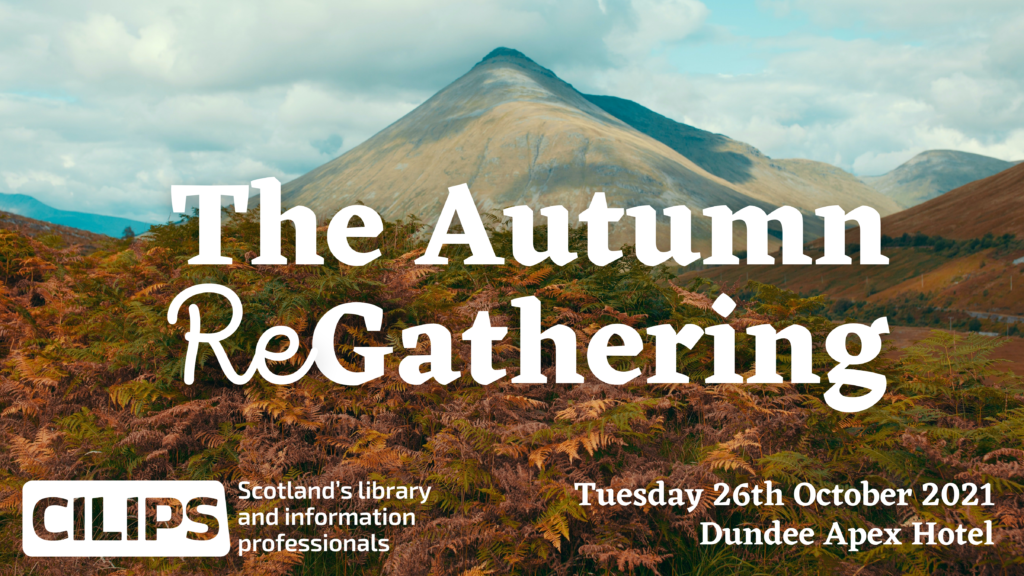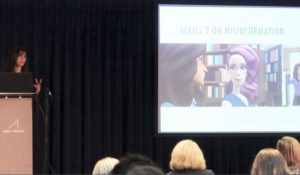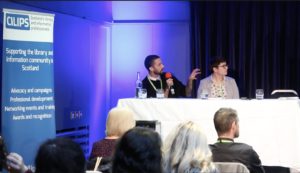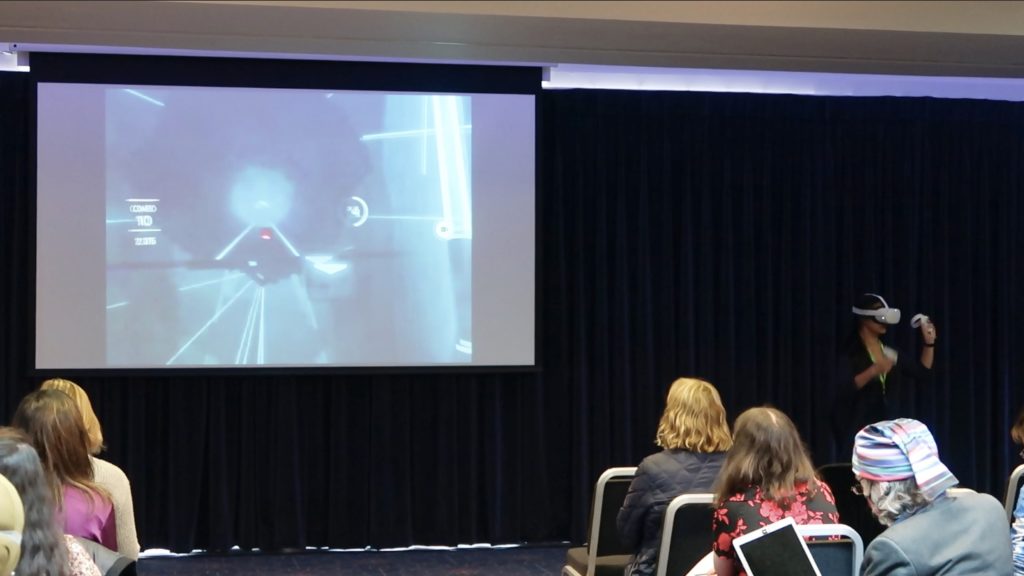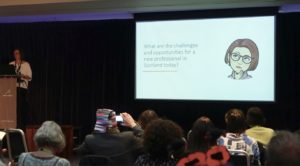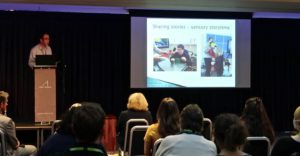The CILIPS Autumn ReGathering – Derek France, SLG Scotland
Category: Blog, Branches and Groups, Professional Development, SLG Scotland
Derek France, School Librarian at Preston Lodge High School, Prestonpans, East Lothian, received School Libraries Group Scotland‘s sponsored place to attend the CILIPS Autumn ReGathering on Tuesday 26th October in Dundee. Here, Derek shares his reflections on the ReGathering experience – thank you Derek and all at SLGS!
This was the first in-person event in over two years and it was wonderful to meet colleagues ‘in real life’, who I had only met online during Zoom or Teams meetings. The day was packed with inspiring speakers and Cleo Jones, President of CILIPS, introduced the day, setting us on the right path: ‘today is a time to reflect and reconnect’. I certainly did.
The first session, ‘Media and Information Literacy: Our Biggest Challenge and Greatest Opportunity?’, was delivered by Dr Jane Secker, Chair of CILIP Information Literacy Group. We were lucky to have the first look at the group’s new Media and Information Literacy Framework. So why another framework? And why now? The group’s research found a need for something more practical and accessible in response to pandemic misinformation and disinformation. With many frameworks aimed at an academic audience, this framework provides practical examples for people in everyday life, centred on five lifelong aspirations: Be informed; Be empowered; Be healthy; Be socially conscious; Be connected. This session fuelled ideas for improving IL library lessons, utilising social media and adapting questionnaires to incorporate real-life student examples.
Dr Konstantina Martzoukou, Emma Grey and Niall MacDonald delivered ‘Maddie is Online: digital literacy in young people’. This has been on my to-do list for some time, so it was fantastic to be introduced to it by those who developed the project. ‘Maddie is Online’ is an open access online video cartoon series available to all schools, with ready-made activities and lesson plans. I will definitely be using this! So far, there are three series, each with a number of episodes: Series 1 Online is Resilience, Series 2 is Misinformation, and Series 3 is Copyright. It was heartening to learn that the project was developed with children’s involvement, asking how they actually feel about their digital lives and, quite literally, giving them a voice. The researchers added voiceovers of the children to the animated characters. This is a wonderful resource for school librarians with the added flexibility of tailoring lessons to suit your needs.
Lydia Ayame Hiraide and Sophie Robertson, student researchers, delivered an empowering session on ‘Climate Action, Inequalities and Knowledge’. They highlighted the wonderful work libraries already do, such as reuse of resources and enabling access to current research and information, while demonstrating the link between gender inequality and climate change. 80% of people displaced by climate change are women. Lydia suggested women’s voices be used to connect people to challenge the negative impacts of our power systems. Sophie talked about her placement at the Glasgow Women’s Library, an inclusive and transformative space giving representation and validating experiences and voices. This was a profoundly moving session and ended with the wonderful ‘Libraries are a plural representation of the world’.
Scott Simpson, Lynsey Ng and Margaret Fox from East Renfrewshire Libraries joined us for ‘Virtually Together: innovation in public libraries’, demonstrating the potential of VR in public libraries and local communities. Their project, Virtually Together, helped tackle social isolation and loneliness. I was lucky to have seen a similar presentation they delivered online, and I’m thankful to Scott Simpson for his advice when applying for funding. The potential for VR use in schools is huge: digital and information literacy, subject-specific projects and, of course, games. Current research suggest VR enhances student memory of study materials, with stronger positive emotions and less negative emotions after using VR as a study tool.
After this session, Cleo Jones announced Alison McAllister as Scotland’s Library & Information Professional of the Year and awarded Honorary CILIPS Memberships to Anne Louise Anglim, Dr Diane Pennington and Martine McChrystal. Congratulations to all!
After a delicious lunch served by the Apex Hotel staff, Ania Matuszewska presented ‘Information Professionals Can Wear Many Hats!’. This was another empowering presentation, urging colleagues to take advantage of the ‘secret power’ of the PKSB. Ania demonstrated how there are numerous jobs for information professionals but are not so obvious because of the job title. She provided examples from the NHS and Civil Service with numerous crossovers of skillsets. This was lively session with many questions and requests for further advice.
‘What does it mean to be a New Professional?’ focused on research from Dr Laura Gormley on the challenges and opportunities available in Scotland today. This was a fascinating talk, presenting research which found advice and networking opportunities for new professionals to be widely available, with the lack of CPD in the public libraries contrasting with CPD availability in health and academic libraries. The topmost concern of new professionals is uncertainty over employment! Chloe Elder and Elizabeth Carney introduced their work with the Students & New Professionals Community: creating a network, hosting events, sharing information and offering a platform to highlight experiences. This was such a refreshing session and good to have such warm, friendly and welcoming colleagues!
Stephen Leitch delivered ‘Stories and Slides: Ideas from a School Librarian’, providing an overview of his interactive virtual library, book talks and book recommendation made for students during lockdown. He found this created a library ‘brand’ and is using this success to further promote the library in school. His enthusiasm on the benefits of reaching out and working with school departments was evident! Working with SED to provide Sensory Storytime: picture books with themed props e.g. feathers, soft toys, shakers and puppets. This was a lively interactive session, providing fresh ideas and inspiration for working with all subject departments. Thanks Stephen!
Dr Andrew Cox closed the day with ‘AI and the Information Professional’, focusing on the many definitions of AI. He suggested we should participate in what AI means to us as information professionals and discussed the ethical implications for users and staff. This is a huge topic with widely differing research findings on the advantages and disadvantages of AI. Andrew suggested that by addressing our weaknesses, AI is something we can own and use to our advantage.
I’d like to thank SLGS for the sponsored place, giving me the opportunity to connect and be inspired by colleagues doing such important work. There is so much to take forward from this brilliant in-person ReGathering!
